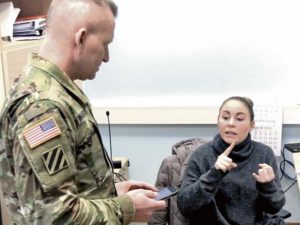The COVID-19 pandemic is creating a new normal for U.S. Army Garrison Rheinland-Pfalz and the world. The garrison Emergency Operations Center is guiding the garrison through the changing circumstances.
Ashley Bryles, the emergency manager who has been on the job just over two months here, had a very short learning curve before being plunged into the COVID-19 crisis.
“My job as an emergency manager is to bring order out of chaos,” Bryles said. “This being a new virus, it’s pretty chaotic because everyone is trying to figure it out and get ahead of it before it causes more chaos.”

The EOC is made up of representatives from the garrison directorates, to include police, fire, safety, public works and other key agencies. They come together when the situation warrants and are the action officers on behalf of their directors.
“It is imperative that all EOC members contribute to the discussion,” said Bill Dial, garrison S3/5/7 chief of operations. “Without the coordination and synchronization of our team we can’t ensure their safety and peace of mind that we are doing everything we can to resolve the situation.”
Bryles served six years in the U.S. Air Force in the emergency management field and came to the garrison after a stint as an emergency manager for a Naval installation.
During her time as an Air Force civilian employee, she was awarded the Air Combat Command David O. Cooke Excellence in Public Service Award. The award recognizes a DOD employee with three to 10 years of federal service who occupies a non-managerial position and exhibits great potential as a future federal executive. Bryles will compete at the Air Force level later this year.
There are challenges during the current crisis that EOC members don’t usually have to face, according to Bryles.
“The biggest challenge is the operational planning. We didn’t have operational plans in place for COVID-19, which didn’t exist a few months ago,” Bryles said. “We’re creating those plans as we go, which isn’t necessarily a bad thing. Sometimes creating plans under pressure, especially in an unknown environment like this, helps get them out to the force.”
The unknown, far-reaching aspect of the COVID-19 crisis is driving long hours and daily meetings of the EOC.
“In normal EOC events, we are tackling one single event that happened in our community, such as a weather-related event or a terrorist attack,” Dial explained. “With COVID-19, it is an invisible and elusive enemy that we have to combat. We have to identify the threat, respond to the threat, predict where the threat might appear next, and then eliminate the threat before it can spread further.”


